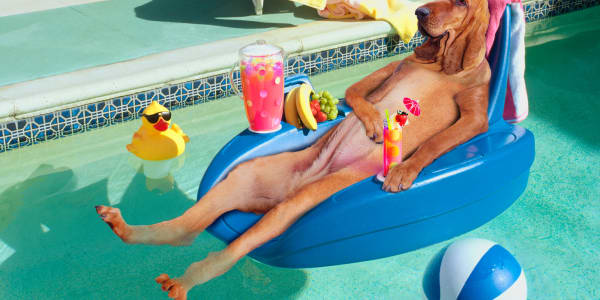It's a dog-beat-dog world at Madison Square Garden this week, and observers often wonder how the animals, owners and handlers in the Westminster Kennel Club dog show—the most important such event in the United States—make it to the big stage.
The path is long, and it can be expensive. The show is not for beginners. In fact, almost a third of the dogs competing in Westminster are there by invitation, having been recognized as one of the top representatives of their breed. The other two-thirds are either champions or well on their way there.
The 2014 show marks a departure from longstanding tradition, however (and the WKC, which is in its 138th year, is big on tradition): Before this year, a dog had to be a champion to enter. Now, entrants can accumulate points toward a championship. With five points earned during events leading up to the WKC (and a $100 entry fee), any purebred dog can aim for the big prize.
A famed breeding ground
The prize they all seek is Best in Show, which is given to a dog that has already been designated Best of Group. Breeds are gathered into groups such as hounds, working or toy, with dogs having similar functions competing against one another. Judges examine each dog and name the group winners.
In 2003 and 2004, an Ibizan Hound named Bunny (actually, Ch. Luxor's Playmate of the Year) was named Best of the Hound Group.
"The first year was awesome because it was totally unexpected," said Bunny's owner, Wendy Anderson of HareHill Hounds in Wisconsin. "We had no expectations that she would win the group. The second year I was a lot more worried, because then I really wanted her to win. She retired the night she won that second group. We wanted her to go out on top."
For owners like Anderson, winning Westminster is the culmination of years of searching, breeding and training—and of what can be an expensive pastime. Costs include not only daily maintenance and veterinary care but also extend to the services of professional groomers and handlers in some cases. And, as in any sport, promotion pays off.
(Read more: All the world's a stage for best in breed)
Show me the money
You might spend $100,000 a year just advertising your dog.Wendy AndersonHare Hill Hounds
"You might spend $100,000 a year just advertising your dog," Anderson said, referring to the glossy color pages touting a dog's accomplishments with an eye toward influencing judges down the road.
Pat Quigley, the owner of Lajosmegyi Kennel in Washington, says that with a professional handler included, the price tag for a year of showing or "campaigning" a dog leading up to Westminster can be more than $250,000.
The return on that investment is mostly personal, rather than monetary.
A dog's success at Westminster can also kick-start interest in that breed. Bull Terriers, Newfoundlands and Papillons have enjoyed a surge in popularity after Westminster showings. Like horses, dogs can earn revenue for owners in the form of stud fees, as well as via offspring from champion lines.
But owners such as Anderson have other reasons for committing the time and money.
"Bunny is my heart dog," she said. "I've had her since she was a puppy. She really loved to show. She was always kind of: Look at me! Who's looking at me? People wait a lifetime to have a dog like Bunny, who's beautiful and sound and has that attitude. Now that she's retired, whatever she wants, she gets."
(Read more: Westminster dog show opens to—gasp!—mutts)
Finding a doggy superstar
The 2014 Best in Show winner is probably now patiently waiting by the Hudson River. Westminster has expanded so much that the organizers added a second venue last year. A massive show area has been set up on the river's passenger-ship piers. Early-round competitions are held there, along with a unique public display that is part of the experience.
Westminster is a benched show—one of only a handful left in the world—which means the dogs and their human attendants must sit in public all day, answering questions (in the case of the humans) and looking fabulous (that would be the dogs).
At Westminster, benching is from 11:30 a.m. to 6 p.m. on Feb. 10 and Feb. 11 at the piers. Dogs in the group competition that evening must be benched at Madison Square Garden until 9 p.m. (The WKC proudly notes that it is one of only three annual events to have been held in each of the garden's four incarnations.)
For the dogs, Westminster is just another walk in the park—or the garden, in this case. But it's more than that for the owners and handlers who in some cases have been working years for this moment.
"It was like winning the Nobel Prize," said Ernesto Lara, handler for Banana Joe, an Affenpinscher that claimed the 2013 Best in Show. "It was something I could never even dream of."
"Not everyone spends $100,000 to campaign their dog or get to Westminster," said Anderson at HareHill Hounds. "I'm referring to the top-winning dogs of each group and the ones who are out with handlers and advertising. A lot of owner-handlers campaign their own dogs for a lot less and still go to Westminster."
Will the 2014 champion be an established superstar ... or an underdog?
—By James Buckley Jr. and Beth Adelman, Special to CNBC.com




